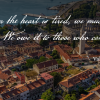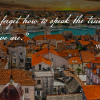
Published: June 15, 2003
View the Original Newsletter: Iskra-121.pdf
About This Issue
Iskra No. 121 is an edition steeped in emotion — part farewell, part reckoning, and part renewal. Writing from a place of weariness yet deep conviction, Valentina Krčmar reflects on a year marked by conflict, loss, and perseverance. The community’s struggle surrounding the Croatian Credit Union continues to echo through its institutions, leaving behind both clarity and fatigue.
This issue reveals Valentina at her most introspective. She examines how words can both wound and heal, and how truth — even when inconvenient — remains a sacred duty. Surrounding her editorial are moments of beauty and humanity: community anniversaries, family milestones, poems of remembrance, and reports of Croatia’s slow but steady progress toward stability.
Editorial: “The Weight of Words”
Valentina begins by admitting the heaviness of her heart. She speaks of misunderstandings and resentment stirred by those who misread Iskra’s mission, and of the toll that public scrutiny has taken. “When people stop listening,” she writes, “words lose their power — and so does community.”
Yet she refuses to surrender. Instead, Valentina reaffirms that Iskra was never meant to be a political weapon but a moral compass — a record of truth and conscience. She thanks those who have continued to stand by her, offering donations, letters, and prayers, describing them as “light in long tunnels.”
Her tone softens when she writes of faith and forgiveness:
“We cannot choose how others interpret what we say, but we can choose to speak without malice.”
The editorial closes with a plea to remember why Iskra exists at all — not to condemn, but to preserve the Croatian voice abroad, one story at a time.
National & Political News: “Croatia’s Path Toward Europe”
The national section provides a snapshot of Croatia’s evolving political scene in mid-2003. The government of Ivica Račan continues its efforts to meet conditions for entry into the European Union, with focus on economic reforms and cooperation with international institutions.
A commentary from Vjesnik reprinted here questions whether the nation’s leaders have lost touch with everyday citizens, citing rising costs and moral disillusionment. Valentina pairs it with her own reflection:
“A nation does not lose faith because it is poor — it loses faith when truth becomes optional.”
Still, she encourages optimism, highlighting Croatia’s improving diplomatic ties and the steady involvement of the diaspora in rebuilding its global image.
Community News: “Celebration Amid Struggle”
Despite the ongoing tension in Toronto’s Croatian-Canadian community, there is much to celebrate. Valentina reports on several uplifting events:
-
The 40th anniversary of the Croatian Peasant Society in Canada, marked by a banquet filled with music and speeches honoring those who built the organization from nothing.
-
A fundraising dinner hosted by the Croatian Women’s Club, whose proceeds supported families in Slavonia still recovering from post-war poverty.
-
Recognition of Father Ante Market, who was transferred to a new parish after many years of service in Mississauga — his farewell described as “a Mass of tears and gratitude.”
Valentina also prints a touching letter from a reader who thanks Iskra for “being the voice of the voiceless,” reminding her that the community’s appreciation far outweighs its criticism.
Culture & Heritage
The cultural pages continue Iskra’s mission to preserve and celebrate Croatian identity. A featured essay on Antun Gustav Matoš revisits the writer’s longing for homeland, portraying him as the eternal wanderer whose pen never stopped yearning for Croatia.
Valentina also publishes several poems sent in by readers — including one titled “Moja Domovina” (My Homeland) — whose simplicity, she notes, “says what whole books cannot.”
A brief article highlights Croatian folklore performances in Hamilton and Windsor, where traditional dances and costumes brought “a touch of the Adriatic” to Canadian soil.
Health & Wellness
Dr. Darko Desaty’s medical column continues to educate readers, this time focusing on osteoporosis. He explains how bone loss progresses silently and encourages women to maintain calcium intake and exercise regularly. His message is hopeful: “Our bodies may age, but discipline and care can keep us strong for decades.”
The section also features an article on the power of gratitude, linking emotional wellbeing with physical health. Valentina writes: “A thankful heart beats differently — it heals faster, forgives sooner, and grows stronger.”
Everyday Life & Humor
The humor section includes lighthearted jokes about aging, village customs, and the universal mischief of children. A short story titled “Baba i kreditna kartica” (Grandma and the Credit Card) draws laughter from readers with its clever twist on modern habits meeting old-world frugality.
In Memoriam
This issue remembers Stjepan Miletić, a respected community elder and lifelong volunteer. His quiet dedication to church and family life is honored with deep affection. Valentina also acknowledges the passing of Zdenka Babić, described as “a woman who gave more than she had, and never expected return.”
Closing Reflection
Valentina closes with a piece that feels like both a confession and a prayer. She admits that Iskra may one day fade, but hopes its pages will remain a testimony of courage and conscience.
“We are all imperfect, but if we write with honesty, something good will survive us.”
She ends by expressing love for her readers — critics and supporters alike — because, as she says, “they keep me writing, thinking, and believing.”




